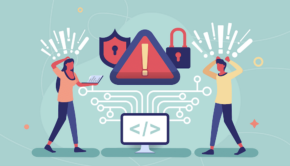6 Email Risks to Prepare for Before 2021
Potential email security risks will take a higher leap in 2021, with global I.T security damages to reach $6 Trillion.
In fact, it is predicted for victims to fall prey to ransomware attacks every 11 seconds. Phishing emails remain the primary tool that hackers use to transmit this malicious software.
Put the guards on already.
Prevention is always wiser and easier than cure in the case of cybersecurity.
In this post, I’m going to show you the 6 email security risks to prepare for before 2021.
Let’s dive right in.
1. Smaller Enterprises will be Attacked by Keylogging Malware Email Attachments

Cyberattacks targeting small businesses through email scams will become more prevalent in the year to come.
Dave Waterson, CEO at security protection software company, estimates small firms to be projected to 40% more cyberattacks in 2021.
Again, small businesses shifting to telecommuting due to the Covid-19 outbreak is to hold accountable for this.
Mr. Dave explains why:
“Working from home means that the physical footprint of sensitive corporate data is widened and organizations lose control over how they access data when employees are out of the security of corporate boundaries.”
Screenshot malware and keyloggers will provide the biggest cybersecurity threat to these companies.
However, these small enterprises should tighten cybersecurity with SME’s best practices to protect their home offices from data breaches.
2. There will be a Growth of Insider Email Schemes
Insider attacks can come from dissatisfied employees, ex-workers, or even innocent employees. The innocent ones can get the credentials exposed to hackers out of carelessness.
As a start-up with budgetary challenges, it can be difficult to combat these insider attacks.
Remote jobs will continue in 2021. It means more end-user devices will have access to the sensitive information on their database. Unless the companies implement some serious defense measures to secure the data on their website, they will keep losing credentials.
3. Healthcare industries will increasingly suffer from data breaches

Practicing telemedicine is the new norm, thanks to the uninvited ‘pandemic effect.’
This has opened opportunities for scammers to easily access the laptops, mobile devices, and home workstations as they are not secured by the enterprise firewall.
In fact, a rising wave of ransomware attacks infected many U.S.hospitals.
According to cybersecurity Ventures, healthcare organizations will experience 5 times data breaches to that of 2017 through ransomware emails in 2021.
Data breaches are possible when someone clicks on the untrusted links in their inbox and invites all the hackers.
Medical organizations will be needing to invest in informatics professionals before 2021.
These professionals would rightly implement critical cybersecurity tips to prepare against the hacker’s ugly motives.
4. More Streaming Channels to be targeted for Email Phishing
Popular streaming services like Youtube and Netflix reported a considerable increase in phishing attacks.
Netflix scam emails ask for login verification. The scammers sometimes get direct and ask for the credit card number to update billing data because of ‘some issues in the payment.’
As for YouTube, the scam email will be apparent from the ‘YouTube Support.’
They usually trap YouTubers with false accusations of uploading a spammy video. The user must provide their account details if they don’t want their channel to be taken down.
Another common tactic these scammers use to take over the account of Youtubers is to send an email with an advertising offer on their channel.
They will be so professional in dealing just like a real company that anyone can easily get duped.
5. Covid-19 Fraud Emails to Experience a Rise
Work-from-home, due to the Covid-19 breakout, provided the ideal atmosphere for hackers.
The employees are working with substandard security, leading to more than ever cybersecurity incidents.
‘With the fear, uncertainty, and sympathy stemming from the COVID-19 situation, attackers have found some key emotions to leverage‘, stated the global security leader, Barracuda.
The primary scam emails of this type are:
- medicinal advertisement for CoronaVirus
- Selling Face Masks
- Donation requests for the organizations that are working to develop a vaccine.
- Donation requests for the ones who lost jobs during this pandemic.
6. The Nigerian Prince Scam will continue Fooling People in 2021
This email scam is going to trap more victims in 2021.
Also referred to as the ‘419 fraud’, the Nigerian Prince successfully looted $700,000 in 2018 from Americans.
This scam is so common that most people stop right at the ‘Big Money’ offer in the email and mark it a fraud.
The Nigerian Prince emails are getting more sophisticated and challenging to catch employing creative innovations than before.
“We all used to snicker at [the Nigerian prince] 15 or 20 years ago, but that Nigerian prince has grown up, has gone to college, has learned a thing or two, and has found a new lucrative career.”, says the CMO of Agari, the famous email security company.
Wrap Up
A malicious cybercrime activity takes down years of hard work within seconds.
Fortunately, these are all ‘preventable’ digital threats.
Let’s recap the threat outlook for 2021:
- SMEs will be the main target of Keyloggers.
- Insider email threats will still be prevalent.
- Healthcare industries will increasingly suffer from data breaches
- Hackers will be targeting streaming site users with phishing emails
- Expect more and more spam emails related to Covid-19.
- The Nigerian Prince scam will be more sophisticated and challenging to identify as a fraud.
Organizations and individuals both will be equally exposed to these email risks.
Using Artificial Intelligence to its core, hackers will be coming up with more automated attacks.
Are you ready to face them already? Yes, you are!
Start planning and reprioritizing your security budget to lose your sensitive data and reputation to these attackers.
We hope you found this post helpful and informative.
What is your take on cybersecurity measures?











![The Impact Of Social Media On Sports [Infographic]](https://technofaq.org/wp-content/uploads/2018/06/Infographic-increasing-sport-socialmedia-150x150.png)




